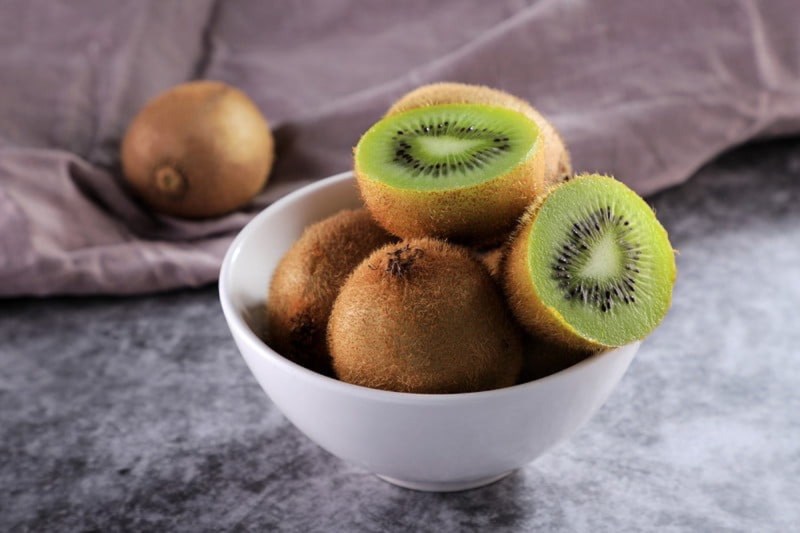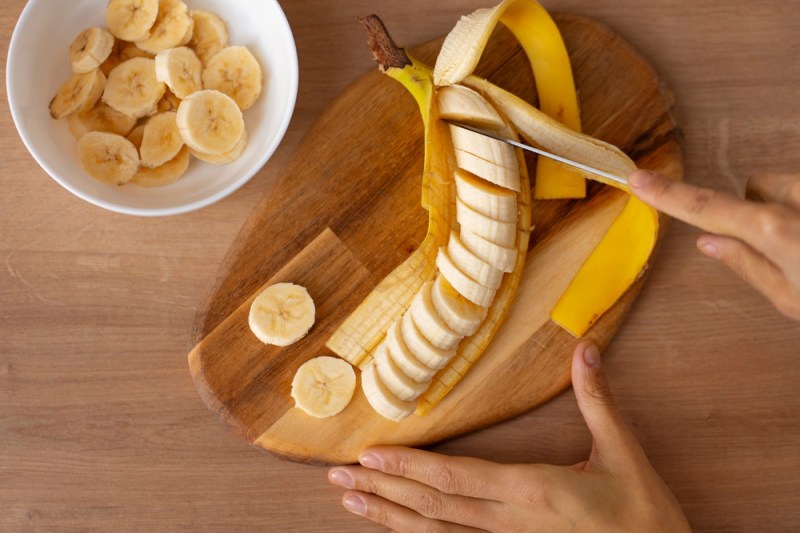Whether you are an avid gym-goer or are simply looking to take care of your health, you’re likely chasing a daily protein goal. As a trainer and nutritionist, I emphasize to all my clients that protein is one of the most important nutrients for building muscle, losing weight, and maintaining a fast metabolism. So, can fruit contribute to your overall goal?
While fruit isn’t often considered a protein source, keep reading to discover 11 high-protein fruits to add to your weekly meal plan to contribute to your overall intake in a healthy way.
Does fruit contain protein?

Yes, fruit contains protein. However, the number of grams of protein in fruit is quite small compared to other food sources like meat, fish, and dairy. While fruit is generally not considered a primary protein source, it can still contribute to your overall protein intake for the day.
The protein content varies by fruit, with some containing slightly more than others. No matter which fruit you are enjoying, it’s worth noting that the vitamins, minerals, fiber, and antioxidants it contains are considerably more valuable than the protein content. To meet your protein needs, it’s best to combine fruit with higher-protein foods like yogurt, nuts, or seeds for a more balanced and nutrient-dense meal or snack.
How much protein should you eat daily?

When it comes to the amount of protein a man should eat daily, it really depends on factors like age, weight, activity level, and fitness goals. The general public is advised 0.8 grams per kilogram (0.36 grams per pound) of body weight, as that is the RDA. For example, a 180-pound man needs about 65 grams daily. However, this amount is really the bare minimum for your body to function.
However, active men, especially those who lift weights or do endurance training, may require nearly double that. According to a ScienceDirect study, “Current data suggests that dietary protein intake necessary to support metabolic adaptation, repair, remodeling, and for protein turnover generally ranges from 1.2 to 2.0 g/kg/day.” If you are consistently in the gym or generally prefer a more athletic build, consider following this standard rather than the RDA.
Can you get enough protein from only fruit?

While some people follow eating methods like the fruit diet, the reality is that it’s very difficult to get enough protein from only fruit. Fruit does contain some protein, but the amounts are minimal and won’t help you meet your daily requirements, especially if you’re active.
Most fruits only provide 1 to 2 grams of protein per serving, meaning you’d have to eat an unrealistic amount to reach adequate levels. Additionally, fruit lacks essential amino acids in sufficient quantities for muscle growth and overall health. If you prefer plant-based options, it’s best to also include other sources like beans, lentils, nuts, seeds, tofu, or dairy alternatives alongside fruit for a more balanced and protein-rich diet.
11 high-protein fruits

- Guava: This tropical fruit is one of the highest in protein, offering about 4.2 grams per cup. It is also packed with fiber, vitamin C, and antioxidants, making it a nutrient-dense choice.
- Avocado: While known for its healthy fats, avocado also contains 3 grams of protein per cup. It’s a versatile fruit that adds creaminess to meals while providing essential nutrients like potassium and fiber.
- Blackberries: These berries deliver 2 grams of protein per cup. They are rich in antioxidants and fiber, supporting digestion and overall health while offering a slight protein boost.
- Jackfruit: A popular meat substitute, jackfruit provides 2.8 grams of protein per cup. Its fibrous texture makes it ideal for savory dishes while also supplying vitamin C and potassium.
- Apricots: Fresh apricots contain about 2.3 grams of protein per cup. They are a great low-calorie snack that also provides vitamin A for eye health.
- Kiwi: With 2.1 grams of protein per cup, kiwi is an excellent source of vitamin C, fiber, and digestive enzymes that aid in gut health.
- Raisins: These dried grapes offer 2 grams of protein per half a cup. They are a concentrated source of natural sugars, making them a quick energy boost.
- Oranges: A cup of orange segments contains 1.2 grams of protein. This citrus fruit is best known for its high vitamin C content, which supports immune health.
- Cherries: Sweet cherries provide about 1.6 grams of protein per cup. They also contain some melatonin, which may help improve sleep quality.
- Bananas: A medium banana contains about 1.3 grams of protein. It’s a great source of quick-digesting carbs, potassium, and fiber.
- Grapefruit: With 1.6 grams of protein per cup, grapefruit is a hydrating fruit that also supports metabolism and immune function with its vitamin C content.
Other plant-based protein sources

As I mentioned before, various fruits provide some protein, but to meet daily needs, it’s best to include other plant-based protein sources, including the following:
- Legumes like lentils, chickpeas, and black beans offer 15 to 18 grams per cup.
- Tofu, tempeh, and edamame are excellent soy-based options, with up to 20 grams per serving.
- Quinoa is a complete protein, providing 8 grams per cup.
- Nuts and seeds, such as almonds, chia seeds, and hemp seeds, add protein and healthy fats.
- Whole grains like oats and brown rice also contribute small amounts.
Frequently asked questions

Are bananas high in protein?
No, bananas are not high in protein. A medium banana contains about 1.3 grams of protein, which is relatively low. However, they are a good source of carbohydrates, fiber, and essential vitamins like vitamins C and B6. For higher protein intake, consider pairing bananas with nuts or Greek yogurt.
Are blueberries high in protein?
Blueberries are not a good protein source, as 1 cup contains only about 1 gram of protein. They are better known for their antioxidants, fiber, and vitamins. To increase protein intake, pair blueberries with Greek yogurt, cottage cheese, or nuts for a balanced snack.
How do you get 40 grams of protein without meat?
You can get 40 grams of protein without meat by combining dairy and plant-based sources. For example, you could eat 1 cup of cooked lentils (18 grams), 1 cup of Greek yogurt (20 grams), and a handful of almonds (6 grams). Other options include tofu, tempeh, beans, quinoa, and chia seeds.




